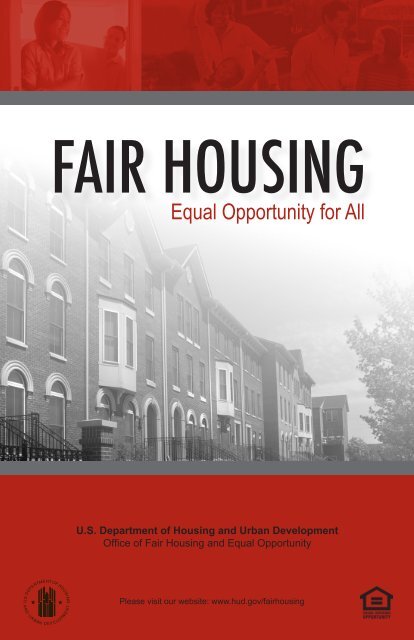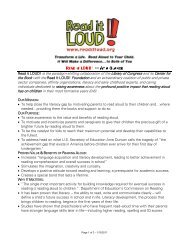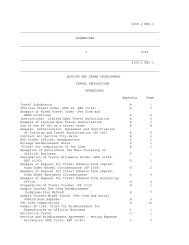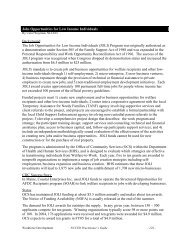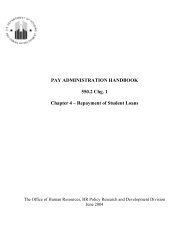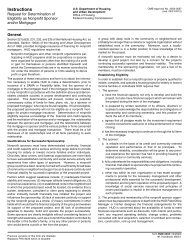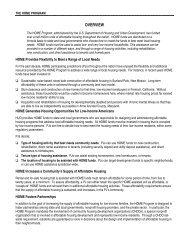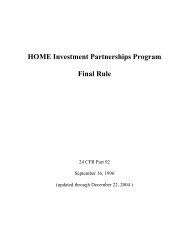FAIR HOUSING Equal Opportunity for All - HUD
FAIR HOUSING Equal Opportunity for All - HUD
FAIR HOUSING Equal Opportunity for All - HUD
You also want an ePaper? Increase the reach of your titles
YUMPU automatically turns print PDFs into web optimized ePapers that Google loves.
<strong>FAIR</strong> <strong>HOUSING</strong><br />
<strong>Equal</strong> <strong>Opportunity</strong> <strong>for</strong> <strong>All</strong><br />
U.S. Department of Housing and Urban Development<br />
Office of Fair Housing and <strong>Equal</strong> <strong>Opportunity</strong><br />
Please visit our website: www.hud.gov/fairhousing
<strong>FAIR</strong> <strong>HOUSING</strong> <strong>Equal</strong> <strong>Opportunity</strong> <strong>for</strong> <strong>All</strong><br />
Fair Housing – <strong>Equal</strong> <strong>Opportunity</strong> <strong>for</strong> <strong>All</strong><br />
America, in every way, represents equality of opportunity <strong>for</strong> all persons.<br />
The rich diversity of its citizens and the spirit of unity that binds us all<br />
symbolize the principles of freedom and justice upon which this nation<br />
was founded. That is why it is extremely disturbing when new immigrants,<br />
minorities, families with children, and persons with disabilities are denied<br />
the housing of their choice because of illegal discrimination.<br />
The Department of Housing and Urban Development (<strong>HUD</strong>) en<strong>for</strong>ces<br />
the Fair Housing Act, which prohibits discrimination and the intimidation<br />
of people in their homes, apartment buildings, and condominium<br />
developments – in nearly all housing transactions, including the rental and<br />
sale of housing and the provision of mortgage loans.<br />
<strong>Equal</strong> access to rental housing and homeownership opportunities is the<br />
cornerstone of this nation’s federal housing policy. Housing providers who<br />
refuse to rent or sell homes to people based on race, color, national origin,<br />
religion, sex, familial status, or disability are violating federal law, and <strong>HUD</strong><br />
will vigorously pursue en<strong>for</strong>cement actions against them.<br />
Housing discrimination is not only illegal, it contradicts in every way the<br />
principles of freedom and opportunity we treasure as Americans. <strong>HUD</strong> is<br />
committed to ensuring that everyone is treated equally when searching <strong>for</strong><br />
a place to call home.<br />
Contents<br />
The Fair Housing Act.............................................................................1<br />
What Housing Is Covered...................................................................1<br />
What Is Prohibited...............................................................................1<br />
Additional Protection If You Have A Disability.......................................3<br />
Housing Protection For Families With Children....................................5<br />
If You Think Your Rights Have Been Violated.......................................6<br />
What Happens When You File A Complaint......................................10<br />
What Happens If I’m Going To Lose My Housing<br />
Through Eviction or Sale...................................................................11<br />
What Happens After A Complaint Investigation.................................12<br />
In Addition...........................................................................................14<br />
U.S. Department of Housing and Urban Development (<strong>HUD</strong>)<br />
451 7 th Street, S.W., Washington, D.C. 20410-2000<br />
i
<strong>FAIR</strong> <strong>HOUSING</strong> <strong>Equal</strong> <strong>Opportunity</strong> <strong>for</strong> <strong>All</strong><br />
ii
<strong>FAIR</strong> <strong>HOUSING</strong> <strong>Equal</strong> <strong>Opportunity</strong> <strong>for</strong> <strong>All</strong><br />
The Fair Housing Act<br />
The Fair Housing Act prohibits discrimination<br />
in housing because of:<br />
• Race or color<br />
• National Origin<br />
• Religion<br />
• Sex<br />
• Familial status (including children under the age of 18 living with<br />
parents or legal custodians; pregnant women and people securing<br />
custody of children under 18)<br />
• Disability<br />
What Housing is Covered<br />
The Fair Housing Act covers most housing. In some circumstances,<br />
the Act exempts owner-occupied buildings with no more than four<br />
units, single-family housing sold or rented without the use of a broker<br />
and housing operated by organizations and private clubs that limit<br />
occupancy to members.<br />
What is Prohibited<br />
In the Sale and Rental of Housing: No one may take any of the following<br />
actions based on race, color, religion, sex, disability, familial status,<br />
or national origin:<br />
• Refuse to rent or sell housing<br />
• Refuse to negotiate <strong>for</strong> housing<br />
• Make housing unavailable<br />
• Otherwise deny a dwelling<br />
• Set different terms, conditions or privileges <strong>for</strong> sale or rental of a<br />
dwelling<br />
• Provide different housing services or facilities<br />
• Falsely deny that housing is available <strong>for</strong> inspection, sale or rental<br />
1
<strong>FAIR</strong> <strong>HOUSING</strong> <strong>Equal</strong> <strong>Opportunity</strong> <strong>for</strong> <strong>All</strong><br />
• For profit, persuade, or try to persuade homeowners to sell or<br />
rent dwellings by suggesting that people of a particular race,<br />
etc. have moved, or are about to move into the neighborhood<br />
(blockbusting) or<br />
• Deny any person access to, membership or participation<br />
in, any organization, facility or service (such as a multiple<br />
listing service) related to the sale or rental of dwellings, or<br />
discriminate against any person in the terms or conditions of<br />
such access, membership or participation.<br />
In Mortgage Lending: No one may take any of the following actions<br />
based on race, color, religion, sex, disability, familial status, or<br />
national origin:<br />
• Refuse to make a mortgage loan<br />
• Refuse to provide in<strong>for</strong>mation regarding loans<br />
• Impose different terms or conditions on a loan, such as<br />
different interest rates, points, or fees<br />
• Discriminate in appraising property<br />
• Refuse to purchase a loan or<br />
• Set different terms or conditions <strong>for</strong> purchasing a loan.<br />
• In addition, it is a violation of the Fair Housing Act to:<br />
• Threaten, coerce, intimidate or interfere with anyone exercising<br />
a fair housing right or assisting others who exercise the right<br />
• Make, print, or publish any statement, in connection with the<br />
sale or rental of a dwelling, which indicates a preference,<br />
limitation, or discrimination based on race, color, religion, sex,<br />
disability, familial status, or national origin. This prohibition<br />
against discriminatory advertising applies to single-family and<br />
owner-occupied housing that is otherwise exempt from the<br />
Fair Housing Act<br />
• Refuse to provide homeowners insurance coverage <strong>for</strong> a<br />
dwelling because of the race, color, religion, sex, disability,<br />
familial status, or national origin of the owner and/or occupants<br />
of a dwelling<br />
• Discriminate in the terms or conditions of homeowners<br />
insurance coverage because of the race, color, religion, sex,<br />
disability, familial status, or national origin of the owner and/or<br />
occupants of a dwelling<br />
2
<strong>FAIR</strong> <strong>HOUSING</strong> <strong>Equal</strong> <strong>Opportunity</strong> <strong>for</strong> <strong>All</strong><br />
• Refuse to provide available in<strong>for</strong>mation on the full range of<br />
homeowners insurance coverage options available because<br />
of the race, etc. of the owner and/or occupants of a dwelling<br />
• Make print or publish any statement, in connection with the<br />
provision of homeowners insurance coverage, that indicates<br />
a preference, limitation or discrimination based on race, color,<br />
religion, sex, disability, familial status or national origin.<br />
Additional Protection If You Have a Disability<br />
If you or someone associated with you:<br />
• Have a physical or mental disability (including hearing, mobility<br />
and visual impairments, cancer, chronic mental illness, HIV/<br />
AIDS, or mental retardation) that substantially limits one or<br />
more major life activities<br />
• Have a record of such a disability or<br />
• Are regarded as having such a disability, a housing provider<br />
may not:<br />
- Refuse to let you make reasonable modifications to your<br />
dwelling or common use areas, at your expense, if it may<br />
be necessary <strong>for</strong> you to fully use the housing. (Where<br />
reasonable, a landlord may permit changes only if you<br />
agree to restore the property to its original condition when<br />
you move.)<br />
- Refuse to make reasonable accommodations in rules,<br />
policies, practices or services if it may be necessary <strong>for</strong><br />
you to use the housing on an equal basis with nondisabled<br />
persons.<br />
Example: A building with a “no pets” policy must allow a visually impaired<br />
tenant to keep a guide dog.<br />
Example: An apartment complex that offers tenants ample, unassigned<br />
parking must honor a request from a mobility-impaired tenant<br />
<strong>for</strong> a reserved space near her apartment if it may be necessary<br />
to assure that she can have access to her apartment.<br />
3
<strong>FAIR</strong> <strong>HOUSING</strong> <strong>Equal</strong> <strong>Opportunity</strong> <strong>for</strong> <strong>All</strong><br />
However, the Fair Housing Act does not protect a person who is a<br />
direct threat to the health or safety of others or who currently uses<br />
illegal drugs.<br />
Accessibility Requirements <strong>for</strong> New Multifamily Buildings: In buildings<br />
with four or more units that were first occupied after<br />
March 13, 1991, and that have an elevator:<br />
• Public and common use areas must be accessible to persons<br />
with disabilities<br />
• <strong>All</strong> doors and hallways must be wide enough <strong>for</strong> wheelchairs<br />
• <strong>All</strong> units must have:<br />
- An accessible route into and through the unit<br />
- Accessible light switches, electrical outlets, thermostats<br />
and other environmental controls<br />
- Rein<strong>for</strong>ced bathroom walls to allow later installation of<br />
grab bars and<br />
- Kitchens and bathrooms that can be used by people in<br />
wheelchairs.<br />
If a building with four or more units has no elevator and was first<br />
occupied after March 13, 1991, these standards apply to ground<br />
floor units only.<br />
These accessibility requirements <strong>for</strong> new multifamily buildings do<br />
not replace more stringent accessibility standards required under<br />
State or local law.<br />
Housing Protection <strong>for</strong> Families with Children<br />
4
<strong>FAIR</strong> <strong>HOUSING</strong> <strong>Equal</strong> <strong>Opportunity</strong> <strong>for</strong> <strong>All</strong><br />
The Fair Housing Act makes it unlawful to discriminate against a person<br />
whose household includes one or more children who are under 18 years<br />
of age (familial status). Familial status protection covers households in<br />
which one or more minor children live with:<br />
• A parent;<br />
• A person who has legal custody (including guardianship) of a<br />
minor child or children; or<br />
• The designee of a parent or legal custodian, with the written<br />
permission of the parent or legal custodian.<br />
Familial status protection also extends to pregnant women and<br />
any person in the process of securing legal custody of a minor<br />
child (including adoptive or foster parents).<br />
The “Housing <strong>for</strong> Older Persons” Exemption: The Fair Housing<br />
Act specifically exempts some senior housing facilities and<br />
communities from liability <strong>for</strong> familial status discrimination. Exempt<br />
senior housing facilities or communities can lawfully refuse to<br />
sell or rent dwellings to families with minor children. In order to<br />
qualify <strong>for</strong> the “housing <strong>for</strong> older persons” exemption, a facility or<br />
community must prove that its housing is:<br />
• Provided under any State or Federal program that <strong>HUD</strong> has<br />
determined to be specifically designed and operated to assist<br />
elderly persons (as defined in the State or Federal program);<br />
or<br />
• Intended <strong>for</strong>, and solely occupied by persons 62 years of age<br />
or older; or<br />
• Intended and operated <strong>for</strong> occupancy by persons 55 years of<br />
age or older.<br />
In order to qualify <strong>for</strong> the “55 or older” housing exemption,<br />
a facility or community must satisfy each of the following<br />
requirements:<br />
• at least 80 percent of the units must have at least one<br />
occupant who is 55 years of age or older; and<br />
5
<strong>FAIR</strong> <strong>HOUSING</strong> <strong>Equal</strong> <strong>Opportunity</strong> <strong>for</strong> <strong>All</strong><br />
• the facility or community must publish and adhere to policies<br />
and procedures that demonstrate the intent to operate as “55<br />
or older” housing; and<br />
• the facility or community must comply with <strong>HUD</strong>’s regulatory<br />
requirements <strong>for</strong> age verification of residents.<br />
The “housing <strong>for</strong> older persons” exemption does not protect<br />
senior housing facilities or communities from liability <strong>for</strong> housing<br />
discrimination based on race, color, religion, sex, disability, or<br />
national origin.<br />
<strong>HUD</strong> is ready to help with any problem of housing discrimination.<br />
If you think your rights have been violated, you may file a<br />
complaint online, write a letter or telephone the <strong>HUD</strong> office<br />
nearest you. You have one year after the alleged discrimination<br />
occurred or ended to file a complaint with <strong>HUD</strong>, but you should<br />
file it as soon as possible.<br />
If You Think your Rights Have Been Violated<br />
What to Tell <strong>HUD</strong>:<br />
• Your name and address<br />
• The name and address of the person your complaint is against<br />
(the respondent)<br />
• The address or other identification of the housing involved<br />
• A short description of the alleged violation (the event that<br />
caused you to believe your rights were violated)<br />
• The date(s) of the alleged violation.<br />
Where to Write or Call: File a complaint online, send a letter to the <strong>HUD</strong><br />
office nearest you, or if you wish, you may call that office directly. Persons<br />
who are deaf or hard of hearing and use a TTY, may call those offices<br />
through the toll-free Federal In<strong>for</strong>mation Relay Service at 1-800-877-8339.<br />
For Connecticut, Maine, Massachusetts, New Hampshire, Rhode Island<br />
and Vermont:<br />
6
<strong>FAIR</strong> <strong>HOUSING</strong> <strong>Equal</strong> <strong>Opportunity</strong> <strong>for</strong> <strong>All</strong><br />
BOSTON REGIONAL OFFICE<br />
(Complaints_office_01@hud.gov)<br />
U.S. Department of Housing and Urban Development<br />
Thomas P. O’Neill Jr. Federal Building<br />
10 Causeway Street, Room 321<br />
Boston, MA 02222-1092<br />
Telephone (617) 994-8300 or 1-800-827-5005<br />
Fax (617) 565-7313 * TTY (617) 565-5453<br />
For New Jersey, New York, Puerto Rico and the U.S. Virgin Islands:<br />
NEW YORK REGIONAL OFFICE<br />
(Complaints_office_02@hud.gov)<br />
U.S. Department of Housing and Urban Development<br />
26 Federal Plaza, Room 3532<br />
New York, NY 10278-0068<br />
Telephone (212) 542-7519 or 1-800-496-4294<br />
Fax (212) 264-9829 * TTY (212) 264-0927<br />
For Delaware, District of Columbia, Maryland, Pennsylvania, Virginia and<br />
West Virginia:<br />
PHILADELPHIA REGIONAL OFFICE<br />
(Complaints_office_03@hud.gov)<br />
U.S. Department of Housing and Urban Development<br />
The Wanamaker Building<br />
100 Penn Square East<br />
Philadelphia, PA 19107-9344<br />
Telephone (215) 861-7646 or 1-888-799-2085<br />
Fax (215) 656-3449 * TTY (215) 656-3450<br />
For Alabama, Florida, Georgia, Kentucky, Mississippi, North Carolina,<br />
South Carolina, and Tennessee:<br />
7
<strong>FAIR</strong> <strong>HOUSING</strong> <strong>Equal</strong> <strong>Opportunity</strong> <strong>for</strong> <strong>All</strong><br />
ATLANTA REGIONAL OFFICE<br />
(Complaints_office_04@hud.gov)<br />
U.S. Department of Housing and Urban Development<br />
Five Points Plaza<br />
40 Marietta Street, 16th Floor<br />
Atlanta, GA 30303-2808<br />
Telephone (404) 331-5140 or 1-800-440-8091 x2493<br />
Fax (404) 331-1021 * TTY (404) 730-2654<br />
For Illinois, Indiana, Michigan, Minnesota, Ohio and Wisconsin:<br />
CHICAGO REGIONAL OFFICE<br />
(Complaints_office_05@hud.gov)<br />
U.S. Department of Housing and Urban Development<br />
Ralph H. Metcalfe Federal Building<br />
77 West Jackson Boulevard, Room 2101<br />
Chicago, IL 60604-3507<br />
Telephone 1-800-765-9372<br />
Fax (312) 886-2837 * TTY (312) 353-7143<br />
For Arkansas, Louisiana, New Mexico, Oklahoma and Texas:<br />
FORT WORTH REGIONAL OFFICE<br />
(Complaints_office_06@hud.gov)<br />
U.S. Department of Housing and Urban Development<br />
801 Cherry Street<br />
Suite 2500, Unit #45<br />
Fort Worth, TX 76102-6803<br />
Telephone (817) 978-5900 or 1-888-560-8913<br />
Fax (817) 978-5876/5851 * TTY (817) 978-5595<br />
For Iowa, Kansas, Missouri and Nebraska:<br />
KANSAS CITY REGIONAL OFFICE<br />
8
<strong>FAIR</strong> <strong>HOUSING</strong> <strong>Equal</strong> <strong>Opportunity</strong> <strong>for</strong> <strong>All</strong><br />
(Complaints_office_07@hud.gov)<br />
U.S. Department of Housing and Urban Development<br />
Gateway Tower II<br />
400 State Avenue, Room 200, 4th Floor<br />
Kansas City, KS 66101-2406<br />
Telephone (913) 551-6958 or 1-800-743-5323<br />
Fax (913) 551-6856 * TTY (913) 551-6972<br />
For Colorado, Montana, North Dakota, South Dakota, Utah and Wyoming:<br />
DENVER REGIONAL OFFICE<br />
(Complaints_office_08@hud.gov)<br />
U.S. Department of Housing and Urban Development<br />
1670 Broadway<br />
Denver, CO 80202-4801<br />
Telephone (303) 672-5437 or 1-800-877-7353<br />
Fax (303) 672-5026 * TTY (303) 672-5248<br />
For Arizona, Cali<strong>for</strong>nia, Hawaii and Nevada:<br />
SAN FRANCISCO REGIONAL OFFICE<br />
(Complaints_office_09@hud.gov)<br />
U.S. Department of Housing and Urban Development<br />
600 Harrison Street, Third Floor<br />
San Francisco, CA 94107-1387<br />
Telephone 1-800-347-3739<br />
Fax (415) 489-6558 * TTY (415) 489-6564<br />
For Alaska, Idaho, Oregon and Washington:<br />
SEATTLE REGIONAL OFFICE<br />
(Complaints_office_10@hud.gov)<br />
U.S. Department of Housing and Urban Development<br />
Seattle Federal Office Building<br />
909 First Avenue, Room 205<br />
Seattle, WA 98104-1000<br />
Telephone (206) 220-5170 or 1-800-877-0246<br />
Fax (206) 220-5447 * TTY (206) 220-5185<br />
9
<strong>FAIR</strong> <strong>HOUSING</strong> <strong>Equal</strong> <strong>Opportunity</strong> <strong>for</strong> <strong>All</strong><br />
If after contacting the local office nearest you, you still have questions –<br />
you may contact <strong>HUD</strong> further at:<br />
U.S. Department of Housing and Urban Development<br />
Office of Fair Housing and <strong>Equal</strong> <strong>Opportunity</strong><br />
451 7th Street, S.W., Room 5204<br />
Washington, DC 20410-2000<br />
Telephone 1-800-669-9777<br />
Fax (202) 708-1425 * TTY 1-800-927-9275<br />
www.hud.gov/fairhousing<br />
If You Are Disabled: <strong>HUD</strong> also provides:<br />
• A TTY phone <strong>for</strong> the deaf/hard of hearing users (see above<br />
list <strong>for</strong> the nearest <strong>HUD</strong> office)<br />
• Interpreters, Tapes and Braille materials<br />
• Assistance in reading and completing <strong>for</strong>ms<br />
What Happens When You File A Complaint<br />
<strong>HUD</strong> will notify you in writing when your complaint is accepted <strong>for</strong><br />
filing under the Fair Housing Act. <strong>HUD</strong> also will:<br />
• Notify the alleged violator (respondent) of the filing of your<br />
complaint, and allow the respondent time to submit a written<br />
answer to the complaint.<br />
• Investigate your complaint, and determine whether or not<br />
there is reasonable cause to believe that the respondent<br />
violated the Fair Housing Act.<br />
• Notify you and the respondent if <strong>HUD</strong> cannot complete its<br />
investigation within 100 days of filing your complaint, and<br />
provide reason <strong>for</strong> the delay.<br />
Fair Housing Act Conciliation: During the complaint investigation, <strong>HUD</strong><br />
is required to offer you and the respondent the opportunity to<br />
voluntarily resolve your complaint with a Conciliation Agreement.<br />
10
<strong>FAIR</strong> <strong>HOUSING</strong> <strong>Equal</strong> <strong>Opportunity</strong> <strong>for</strong> <strong>All</strong><br />
A Conciliation Agreement provides individual relief to you, and<br />
protects the public interest by deterring future discrimination by<br />
the respondent. Once you and the respondent sign a Conciliation<br />
Agreement, and <strong>HUD</strong> approves the Agreement, <strong>HUD</strong> will cease<br />
investigating your complaint. If you believe that the respondent<br />
has violated breached your Conciliation Agreement, you should<br />
promptly notify the <strong>HUD</strong> Office that investigated your complaint. If<br />
<strong>HUD</strong> determines that there is reasonable cause to believe that the<br />
respondent violated the Agreement, <strong>HUD</strong> will ask the U.S.<br />
Department of Justice to file suit against the respondent in Federal<br />
District Court to en<strong>for</strong>ce the terms of the Agreement.<br />
Complaint Referrals to State or Local Public Fair Housing Agencies:<br />
If <strong>HUD</strong> has certified that your State or local public fair housing<br />
agency en<strong>for</strong>ces a civil rights law or ordinance that provides rights,<br />
remedies and protections that are “substantially equivalent” to<br />
the Fair Housing Act, <strong>HUD</strong> must promptly refer your complaint to<br />
that agency <strong>for</strong> investigation, and must promptly notify you of the<br />
referral. The State or local agency will investigate your complaint<br />
under the “substantially equivalent” State or local civil rights law<br />
or ordinance. The State or local public fair housing agency must<br />
start investigating your complaint within 30 days of <strong>HUD</strong>’s referral,<br />
or <strong>HUD</strong> may retrieve (“reactivate”) the complaint <strong>for</strong> investigation<br />
under the Fair Housing Act.<br />
What Happens If I’m Going to Lose My Housing<br />
Through Eviction or Sale<br />
If you need immediate help to stop or prevent a severe problem<br />
caused by a Fair Housing Act violation, <strong>HUD</strong> may be able to assist<br />
you as soon as you file a complaint. <strong>HUD</strong> may authorize the U.S.<br />
Department of Justice to file a Motion in Federal District Court<br />
<strong>for</strong> a Temporary Restraining Order (TRO) against the respondent,<br />
followed by a Preliminary Injunction pending the outcome of <strong>HUD</strong>’s<br />
investigation. A Federal Judge may grant a TRO or a Preliminary<br />
Injunction against a respondent in cases where:<br />
11
<strong>FAIR</strong> <strong>HOUSING</strong> <strong>Equal</strong> <strong>Opportunity</strong> <strong>for</strong> <strong>All</strong><br />
• Irreparable (irreversible) harm or injury to housing rights is<br />
likely to occur without <strong>HUD</strong>’s intervention; and<br />
• There is substantial evidence that the respondent has violated<br />
the Fair Housing Act.<br />
Example: An owner agrees to sell a house, but, after discovering that the<br />
buyers are black, pulls the house off the market, then promptly<br />
lists it <strong>for</strong> sale again. The buyers file a discrimination complaint<br />
with <strong>HUD</strong>. <strong>HUD</strong> may authorize the U.S. Department of Justice to<br />
seek an injunction in Federal District Court to prevent the owner<br />
from selling the house to anyone else until <strong>HUD</strong> investigates the<br />
complaint.<br />
What Happens After A Complaint Investigation<br />
Determination of Reasonable Cause, Charge of Discrimination, and<br />
Election: When your complaint investigation is complete, <strong>HUD</strong><br />
will prepare a Final Investigative Report summarizing the evidence<br />
gathered during the investigation. If <strong>HUD</strong> determines that there is<br />
reasonable cause to believe that the respondent(s) discriminated<br />
against you, <strong>HUD</strong> will issue a Determination of Reasonable<br />
Cause and a Charge of Discrimination against the respondent(s).<br />
You and the respondent(s) have twenty (20) days after receiving<br />
notice of the Charge to decide whether to have your case heard<br />
by a <strong>HUD</strong> Administrative Law Judge (ALJ) or to have a civil trial in<br />
Federal District Court.<br />
<strong>HUD</strong> Administrative Law Judge Hearing: If neither you nor the<br />
respondent elects to have a Federal civil trial be<strong>for</strong>e the 20-day<br />
Election Period expires, <strong>HUD</strong> will promptly schedule a Hearing <strong>for</strong><br />
your case be<strong>for</strong>e a <strong>HUD</strong> ALJ. The ALJ Hearing will be conducted<br />
in the locality where the discrimination allegedly occurred. During<br />
the ALJ Hearing, you and the respondent(s) have the right to<br />
appear in person, to be represented by legal counsel, to present<br />
evidence, to cross-examine witnesses and to request subpoenas<br />
in aid of discovery of evidence. <strong>HUD</strong> attorneys will represent you<br />
during the ALJ Hearing at no cost to you; however, you may also<br />
12
<strong>FAIR</strong> <strong>HOUSING</strong> <strong>Equal</strong> <strong>Opportunity</strong> <strong>for</strong> <strong>All</strong><br />
choose to intervene in the case and retain your own attorney. At<br />
the conclusion of the Hearing, the <strong>HUD</strong> ALJ will issue a Decision<br />
based on findings of fact and conclusions of law. If the <strong>HUD</strong> ALJ<br />
concludes that the respondent(s) violated the Fair Housing Act,<br />
the respondent(s) can be ordered to:<br />
• Compensate you <strong>for</strong> actual damages, including out-of-pocket<br />
expenses and emotional distress damages<br />
• Provide permanent injunctive relief.<br />
• Provide appropriate equitable relief (<strong>for</strong> example, make the<br />
housing available to you).<br />
• Pay your reasonable attorney’s fees.<br />
• Pay a civil penalty to <strong>HUD</strong> to vindicate the public interest. The<br />
maximum civil penalties are: $16,000, <strong>for</strong> a first violation of<br />
the Act; $37,500 if a previous violation has occurred within<br />
the preceding five-year period; and $65,000 if two or more<br />
previous violations have occurred within the preceding<br />
seven-year period.<br />
Civil Trial in Federal District Court: If either you or the respondent elects<br />
to have a Federal civil trial <strong>for</strong> your complaint, <strong>HUD</strong> must refer<br />
your case to the U.S. Department of Justice <strong>for</strong> en<strong>for</strong>cement. The<br />
U.S. Department of Justice will file a civil lawsuit on your behalf<br />
in the U.S. District Court in the district in which the discrimination<br />
allegedly occurred. You also may choose to intervene in the case<br />
and retain your own attorney. Either you or the respondent may<br />
request a jury trial, and you each have the right to appear in<br />
person, to be represented by legal counsel, to present evidence,<br />
to cross-examine witnesses, and to request subpoenas in aid of<br />
discovery of evidence. If the Federal Court decides in your favor,<br />
a Judge or jury may order the respondent(s) to:<br />
• Compensate you <strong>for</strong> actual damages, including out-of-pocket<br />
expenses and emotional distress damages<br />
• Provide permanent injunctive relief.<br />
• Provide appropriate equitable relief (<strong>for</strong> example, make the<br />
housing available to you).<br />
• Pay your reasonable attorney’s fees.<br />
• Pay punitive damages to you.<br />
13
<strong>FAIR</strong> <strong>HOUSING</strong> <strong>Equal</strong> <strong>Opportunity</strong> <strong>for</strong> <strong>All</strong><br />
Determination of No Reasonable Cause and Dismissal: If <strong>HUD</strong><br />
finds that there is no reasonable cause to believe that the<br />
respondent(s) violated the Act, <strong>HUD</strong> will dismiss your complaint<br />
with a Determination of No Reasonable Cause. <strong>HUD</strong> will notify<br />
you and the respondent(s) of the dismissal by mail, and you may<br />
request a copy of the Final Investigative Report.<br />
Reconsiderations of No Reasonable Cause Determinations: The Fair<br />
Housing Act provides no <strong>for</strong>mal appeal process <strong>for</strong> complaints<br />
dismissed by <strong>HUD</strong>. However, if your complaint is dismissed with<br />
a Determination of No Reasonable Cause, you may submit a<br />
written request <strong>for</strong> a reconsideration review to: Director, FHEO<br />
Office of En<strong>for</strong>cement, U.S. Department of Housing and Urban<br />
Development, 451 7th Street, SW, Room 5206, Washington, DC<br />
20410-2000.<br />
In Addition<br />
You May File a Private Lawsuit: You may file a private civil lawsuit without<br />
first filing a complaint with <strong>HUD</strong>. You must file your lawsuit within<br />
two (2) years of the most recent date of alleged discriminatory<br />
action.<br />
If you do file a complaint with <strong>HUD</strong> and even if <strong>HUD</strong> dismisses<br />
your complaint, the Fair Housing Act gives you the right to file a<br />
private civil lawsuit against the respondent(s) in Federal District<br />
Court. The time during which <strong>HUD</strong> was processing your complaint<br />
is not counted in the 2-year filing period. You must file your lawsuit<br />
at your own expense; however, if you cannot af<strong>for</strong>d an attorney,<br />
the Court may appoint one <strong>for</strong> you.<br />
Even if <strong>HUD</strong> is still processing your complaint, you may file a<br />
private civil lawsuit against the respondent, unless (1) you have<br />
already signed a <strong>HUD</strong> Conciliation Agreement to resolve your<br />
<strong>HUD</strong> complaint; or (2) a <strong>HUD</strong> Administrative Law Judge has<br />
commenced an Administrative Hearing <strong>for</strong> your complaint.<br />
14
<strong>FAIR</strong> <strong>HOUSING</strong> <strong>Equal</strong> <strong>Opportunity</strong> <strong>for</strong> <strong>All</strong><br />
Other Tools to Combat Housing Discrimination:<br />
• If there is noncompliance with the order of an Administrative<br />
Law Judge, <strong>HUD</strong> may seek temporary relief, en<strong>for</strong>cement of<br />
the order or a restraining order in a United States Court of<br />
Appeals.<br />
• The Attorney General may file a suit in Federal District Court<br />
if there is reasonable cause to believe a pattern or practice of<br />
housing discrimination is occurring.<br />
15
Notes<br />
<strong>FAIR</strong> <strong>HOUSING</strong> <strong>Equal</strong> <strong>Opportunity</strong> <strong>for</strong> <strong>All</strong><br />
16
Notes<br />
<strong>FAIR</strong> <strong>HOUSING</strong> <strong>Equal</strong> <strong>Opportunity</strong> <strong>for</strong> <strong>All</strong><br />
17
Notes<br />
<strong>FAIR</strong> <strong>HOUSING</strong> <strong>Equal</strong> <strong>Opportunity</strong> <strong>for</strong> <strong>All</strong><br />
18
For Further In<strong>for</strong>mation<br />
The purpose of this brochure is to summarize your right to<br />
fair housing. The Fair Housing Act and <strong>HUD</strong>’s regulations<br />
contain more detail and technical in<strong>for</strong>mation. If you need<br />
a copy of the law or regulations, contact the <strong>HUD</strong> Fair<br />
Housing Office nearest you. See the list of <strong>HUD</strong> Fair<br />
Housing Offices on pages 7-10.<br />
CONNECT WITH <strong>HUD</strong><br />
Department of Housing and Urban Development<br />
Room 5204<br />
Washington, DC 20410-2000<br />
Please visit our website: www.hud.gov/fairhousing<br />
<strong>HUD</strong>-1686-1-FHEO<br />
2011


